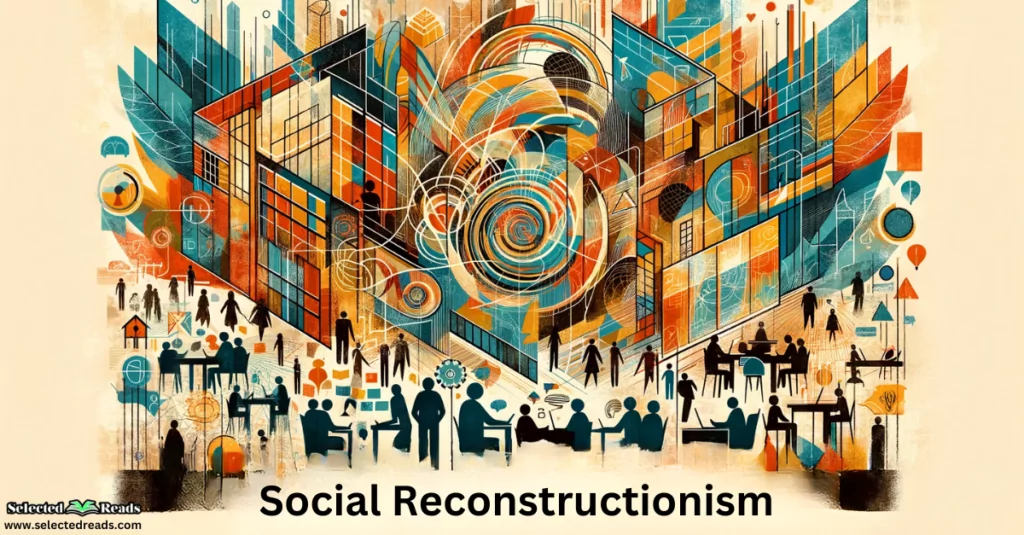In this blog post, I address the concept of social reconstructionism, explain what it means, and provide you with resources to help you deepen your understanding of this concept. It is true that social reconstructionism is especially related to education but its implications can be seen in many other areas of life.
Social reconstructionism is based on the idea that society is a constantly changing and evolving organism. It is not static, but rather an open system that can be reconstructed for the benefit of all its members.
Reconstructionists believe in working with society to improve its conditions and circumstances. They are critical of the status quo and advocate for social reform in order to promote change and progress.
What Is Social Reconstructionism?
Social reconstructionism is a philosophy of education that emerged in the 1920s and 1930s with the goal of addressing societal issues such as war, prosperity, and depression. It emphasizes the need for a critical examination of society and the implications of social inequality in order to bring about social change through education. This approach to education contends that schools should play an active role in addressing social problems and promoting social justice.
Social Reconstructionism According to Different Scholars
Social reconstructionism has been defined and interpreted by various scholars in different ways. Here is how some prominent scholars have viewed social reconstructionism:
- George Counts (1932) – In his seminal work, “Dare the School Build a New Social Order?”, Counts argued that schools should actively work towards building a new social order, focusing on a more equitable and just society. He believed that educators should assume a central role in shaping society through their teaching and engagement with students.
- Theodore Brameld (1946) – Brameld, in his book “Education as Power,” presented social reconstructionism as an educational approach that seeks to empower students and teachers to create a more democratic and just society. He emphasized the importance of critical thinking and the development of a sense of social responsibility among students.
- Paulo Freire (1968) – Freire’s “Pedagogy of the Oppressed” supports a social reconstructionist approach to education. Although he did not explicitly label his philosophy as such, his emphasis on dialogue, critical consciousness, and the transformation of oppressive social structures aligns with social reconstructionism.
- Henry Giroux (1980s) – Giroux, a critical pedagogue, has emphasized the importance of connecting education to broader social issues and the development of a critical consciousness. He argued that schools should be sites of resistance and transformation, actively working to challenge and dismantle oppressive social structures.
While these views differ in certain aspects, they share a common emphasis on the role of education in addressing and transforming social problems and injustices. Social reconstructionism, as a whole, seeks to empower students to become active, engaged citizens capable of shaping society for the better.
What are the Goals of Social Reconstructionism?
Social reconstructionism aims to create a more equitable and just society by emphasizing the importance of social reform initiatives, such as political action and community organizing. It views education as a tool for shaping individuals into active and engaged citizens who are capable of addressing social problems and advocating for change.
The social reconstructionist approach to education is learner-centered, and emphasizes the importance of critical thinking, problem solving, and collaboration. It is concerned with providing students with the skills and knowledge necessary to become agents of social change, and encourages the development of a sense of social responsibility.
Key Proponents of Social Reconstructionism
Some of the main proponents of social reconstructionism include George Counts, Harold Rugg, and Theodore Brameld. George Counts is considered the father of social reconstructionism and was a leading critic of traditional education.
Harold Rugg was a professor of education who believed in the transformative potential of education to create a more democratic and just society. Theodore Brameld further developed the idea of social reconstructionism and emphasized the need for interdisciplinary education and a global perspective.
These scholars believed that education should be a tool for social change and that classrooms should be transformed into spaces where students could critically examine social problems and develop the skills necessary to address them.
They also advocated for a curriculum that was relevant to students’ lives and experiences, and that encourage active participation in the world beyond the classroom. Today, the principles of social reconstructionism continue to influence educational theory and practice, particularly in the fields of social justice and critical pedagogy.
The Social Reconstructionist Curriculum
The curriculum in a social reconstructionist classroom emphasizes civic education, service learning, critical thinking, and the exploration of social inequities. Students learn about topics such as civic engagement, social responsibility, and the causes of social problems.
They are also encouraged to explore their own values and beliefs, and to think critically about the world around them. Coursework often includes critical analysis of current events, community service projects, and discussions on topics such as race, class, gender, and privilege.
Teachers also strive to create a sense of community in the classroom by engaging students in collaborative projects, group discussions, and cooperative learning activities. The aim is to provide students with an environment where they can share their ideas, express themselves freely, and develop social skills that will benefit them in the future.
Final thoughts
In summary, social reconstructionism is a progressive approach to education that views schools as agents of social change. It emphasizes the importance of addressing social problems and promoting social justice through critical examination of society and engagement in social reform initiatives. This approach to education prioritizes the development of active and engaged citizens who have the skills and knowledge necessary to bring about positive social change.
More references
Here are some key academic references related to the concept of social reconstructionism:
1. Counts, G. S. (1932). Dare the school build a new social order? New York: John Day Company.
- This seminal work by George Counts is often considered the foundation of social reconstructionism. In it, Counts challenges educators to build a more just and equal society through education.
2. Brameld, T. (1950). Education as power. New York: Harcourt, Brace, and Company.
- Theodore Brameld’s work further develops the social reconstructionist perspective, emphasizing the potential for education to empower individuals and transform society.
3. Freire, P. (1970). Pedagogy of the oppressed. New York: Herder and Herder.
- Paulo Freire’s influential book offers a powerful critique of traditional education and proposes a pedagogy focused on empowering oppressed communities, which is closely aligned with social reconstructionism.
4. Giroux, H. A. (1988). Teachers as intellectuals: Toward a critical pedagogy of learning. Granby, MA: Bergin & Garvey.
- Henry Giroux’s work on critical pedagogy is an important contribution to social reconstructionist thought. He argues for the importance of teachers as agents of social change and the need for critical reflection in education.
5. Apple, M. W. (1996). Cultural politics and education. New York: Teachers College Press.
- Michael Apple’s work discusses the political and cultural dimensions of education and highlights the importance of understanding power dynamics within educational institutions. His ideas are relevant to social reconstructionist thought.
6. Kincheloe, J. L., & McLaren, P. (2007). Critical pedagogy: Where are we now? New York: Peter Lang.
- This edited volume brings together various perspectives on critical pedagogy, including social reconstructionism, and offers insights into the current state of the field.
7. Dewey, J. (1916). Democracy and education: An introduction to the philosophy of education. New York: Macmillan.
- John Dewey’s work on progressive education has influenced social reconstructionist thought. In this book, Dewey argues that the goal of education should be to promote democratic values and active citizenship.
8. Kozol, J. (1991). Savage inequalities: Children in America’s schools. New York: Crown.
- Jonathan Kozol’s work examines the inequalities present in the American education system and calls for reforms to address these disparities, which aligns with social reconstructionist principles.
9. Noddings, N. (1992). The challenge to care in schools: An alternative approach to education. New York: Teachers College Press.
- Nel Noddings’ work on the ethics of care in education highlights the importance of cultivating caring relationships and social responsibility in schools, which is consistent with social reconstructionist goals.
10. Banks, J. A. (1993). Multicultural education: Issues and perspectives. Boston, MA: Allyn and Bacon.
- James A. Banks’ work on multicultural education emphasizes the importance of teaching diverse perspectives and promoting social justice, which aligns with social reconstructionist thought.
11. Ayers, W., Hunt, J. A., & Quinn, T. (Eds.). (1998). Teaching for social justice. New York: Teachers College Press.
- This edited volume features essays from educators who advocate for social justice in education, discussing various pedagogical approaches that are consistent with social reconstructionism.
12. Kumashiro, K. K. (2000). Toward a theory of anti-oppressive education. Review of Educational Research, 70(1), 25-53.
- Kevin Kumashiro’s work on anti-oppressive education examines how educational practices can challenge and disrupt systems of oppression, which is in line with social reconstructionist aims.





